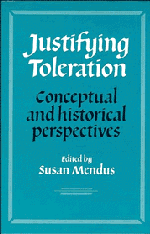Book contents
- Frontmatter
- Contents
- Preface
- Introduction
- 1 Scepticism and toleration in the seventeenth century
- 2 A more tolerant Hobbes?
- 3 Locke: toleration and the rationality of persecution
- 4 Toleration and Mill's liberty of thought and discussion
- 5 Rousseau and respect for others
- 6 The intolerable
- 7 Autonomy, toleration, and the harm principle
- 8 Friendship, truth, and politics: Hannah Arendt and toleration
- 9 Dissent, toleration, and civil rights in communism
- 10 Liberalism, marxism, and tolerance
- 11 Socialism and toleration
- Index
Introduction
Published online by Cambridge University Press: 20 May 2010
- Frontmatter
- Contents
- Preface
- Introduction
- 1 Scepticism and toleration in the seventeenth century
- 2 A more tolerant Hobbes?
- 3 Locke: toleration and the rationality of persecution
- 4 Toleration and Mill's liberty of thought and discussion
- 5 Rousseau and respect for others
- 6 The intolerable
- 7 Autonomy, toleration, and the harm principle
- 8 Friendship, truth, and politics: Hannah Arendt and toleration
- 9 Dissent, toleration, and civil rights in communism
- 10 Liberalism, marxism, and tolerance
- 11 Socialism and toleration
- Index
Summary
This collection of papers traces the philosophical history of the concept of toleration, its justification, and its limits. The contributors discuss the theories advanced by philosophers from the seventeenth century to the present day, and it is remarkable, but perhaps not surprising, that in examining the concept of toleration, these philosophers were acutely aware of the particular practical form which problems of toleration took in their own societies. Thus, for example, John Locke placed emphasis on that religious intolerance which was so problematic in seventeenth-century Britain. Similarly, Hannah Arendt's writings on the topic were profoundly influenced by her own experience as a Jew forced to flee from her native Germany, and John Stuart Mill's views in his essay On Liberty are famously informed by his own concerns about the tyranny of public opinion which he felt to be prevalent in Victorian Britain. In these respects, the writings of the philosophers discussed here are historically specific. At the same time, however, they are of continuing and universal importance. This is not simply because these are great philosophers, whose views we should understand, but also because the general nature of the problem of toleration persists, even when its specific occasion has disappeared. Thus, those historically specific events which prompted Locke's Letter concerning Toleration, or Mill's On Liberty, are matters for history, but the general problems of what grounds and what sets limits to toleration are as pressing now as they ever were.
- Type
- Chapter
- Information
- Justifying TolerationConceptual and Historical Perspectives, pp. 1 - 20Publisher: Cambridge University PressPrint publication year: 1988
- 4
- Cited by



